Abstract
Cognitive theories of the etiology of depression in adulthood have received widespread acceptance. To date there is little evidence of the role of cognitive distortion in the etiology of depression among adolescents. This study was conducted to determine whether or not cognitive distortion differentiates depressed adolescents from non-depressed adolescents. The Dysfunctional Attitude Scale, a measure of cognitive distortion, was administered to three groups of adolescents: clinically depressed; non-depressed with non-psychotic psychiatric disorders; and a non-clinical group of adolescents without psychiatric disorders. A subset of the depressed patients was re-administered the scale after they had clinically recovered from the depressive episode. The depressed adolescents had significantly greater cognitive distortion than the non-depressed adolescents. Remission of the depressive disorder was associated with a significant reduction in cognitive distortion, although the level of cognitive distortion was still significantly higher than normal.
Full text
PDF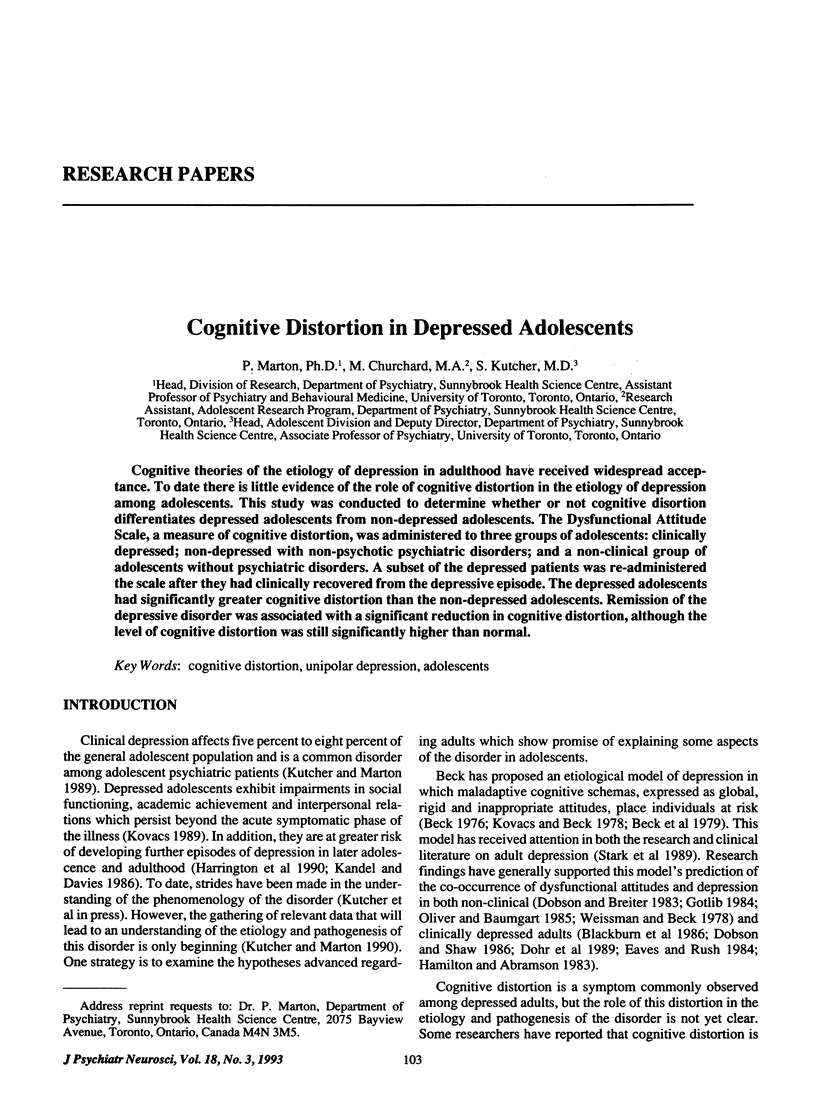
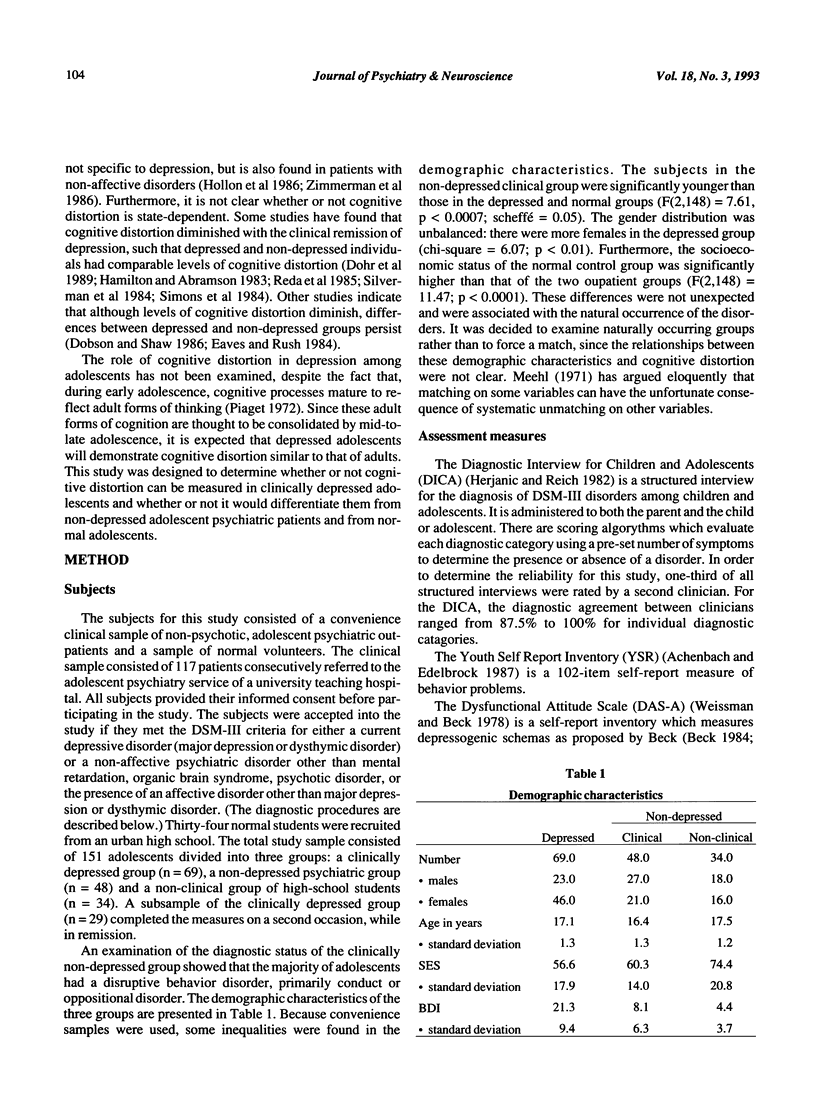
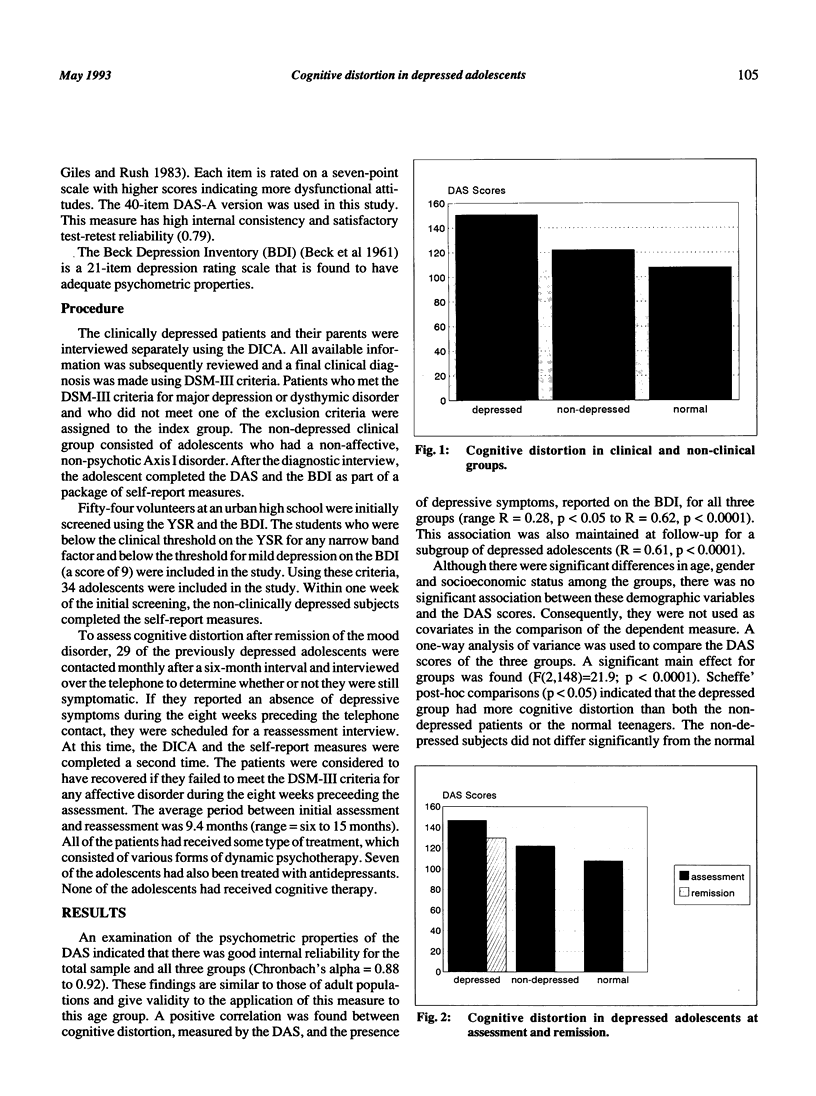
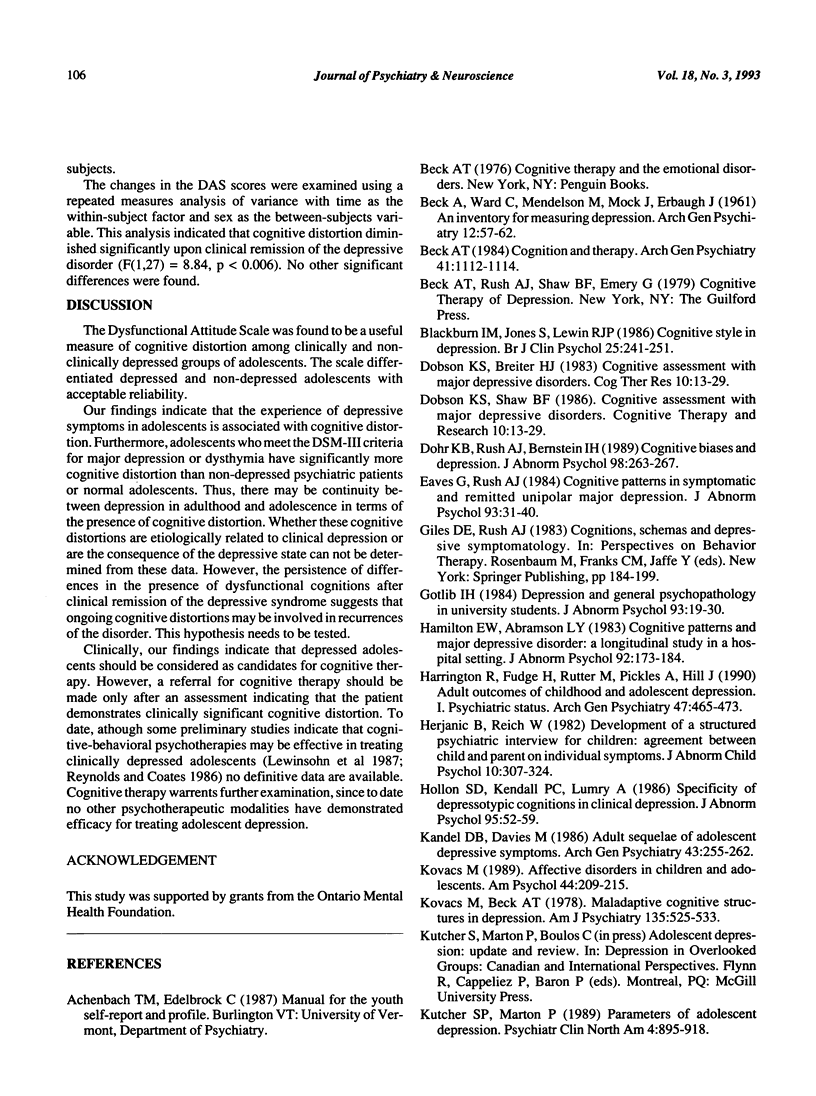
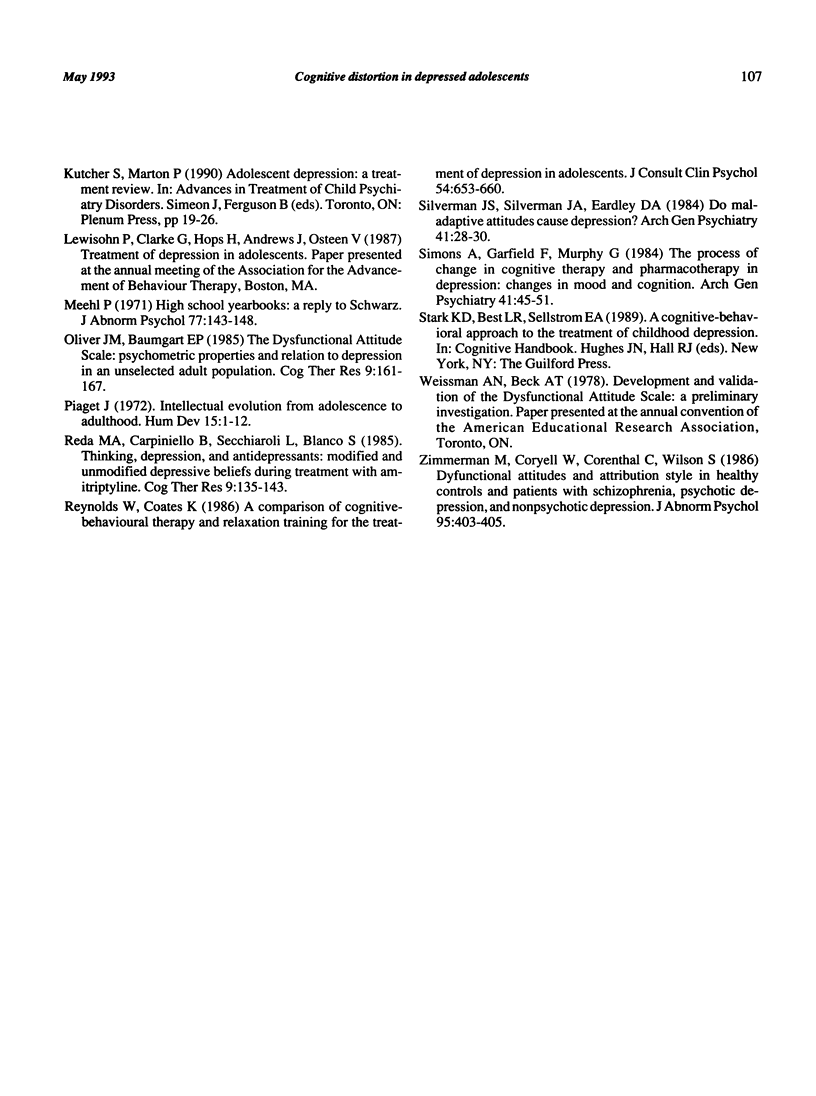
Images in this article
Selected References
These references are in PubMed. This may not be the complete list of references from this article.
- Beck A. T. Cognition and therapy. Arch Gen Psychiatry. 1984 Nov;41(11):1112–1115. doi: 10.1001/archpsyc.1983.01790220102020. [DOI] [PubMed] [Google Scholar]
- Blackburn I. M., Jones S., Lewin R. J. Cognitive style in depression. Br J Clin Psychol. 1986 Nov;25(Pt 4):241–251. doi: 10.1111/j.2044-8260.1986.tb00704.x. [DOI] [PubMed] [Google Scholar]
- Dohr K. B., Rush A. J., Bernstein I. H. Cognitive biases and depression. J Abnorm Psychol. 1989 Aug;98(3):263–267. doi: 10.1037//0021-843x.98.3.263. [DOI] [PubMed] [Google Scholar]
- Eaves G., Rush A. J. Cognitive patterns in symptomatic and remitted unipolar major depression. J Abnorm Psychol. 1984 Feb;93(1):31–40. doi: 10.1037//0021-843x.93.1.31. [DOI] [PubMed] [Google Scholar]
- Gotlib I. H. Depression and general psychopathology in university students. J Abnorm Psychol. 1984 Feb;93(1):19–30. doi: 10.1037//0021-843x.93.1.19. [DOI] [PubMed] [Google Scholar]
- Hamilton E. W., Abramson L. Y. Cognitive patterns and major depressive disorder: a longitudinal study in a hospital setting. J Abnorm Psychol. 1983 May;92(2):173–184. doi: 10.1037//0021-843x.92.2.173. [DOI] [PubMed] [Google Scholar]
- Harrington R., Fudge H., Rutter M., Pickles A., Hill J. Adult outcomes of childhood and adolescent depression. I. Psychiatric status. Arch Gen Psychiatry. 1990 May;47(5):465–473. doi: 10.1001/archpsyc.1990.01810170065010. [DOI] [PubMed] [Google Scholar]
- Herjanic B., Reich W. Development of a structured psychiatric interview for children: agreement between child and parent on individual symptoms. J Abnorm Child Psychol. 1982 Sep;10(3):307–324. doi: 10.1007/BF00912324. [DOI] [PubMed] [Google Scholar]
- Hollon S. D., Kendall P. C., Lumry A. Specificity of depressotypic cognitions in clinical depression. J Abnorm Psychol. 1986 Feb;95(1):52–59. doi: 10.1037//0021-843x.95.1.52. [DOI] [PubMed] [Google Scholar]
- Kandel D. B., Davies M. Adult sequelae of adolescent depressive symptoms. Arch Gen Psychiatry. 1986 Mar;43(3):255–262. doi: 10.1001/archpsyc.1986.01800030073007. [DOI] [PubMed] [Google Scholar]
- Kovacs M. Affective disorders in children and adolescents. Am Psychol. 1989 Feb;44(2):209–215. doi: 10.1037//0003-066x.44.2.209. [DOI] [PubMed] [Google Scholar]
- Kovacs M., Beck A. T. Maladaptive cognitive structures in depression. Am J Psychiatry. 1978 May;135(5):525–533. doi: 10.1176/ajp.135.5.525. [DOI] [PubMed] [Google Scholar]
- Kutcher S. P., Marton P. Parameters of adolescent depression. A review. Psychiatr Clin North Am. 1989 Dec;12(4):895–918. [PubMed] [Google Scholar]
- Reynolds W. M., Coats K. I. A comparison of cognitive-behavioral therapy and relaxation training for the treatment of depression in adolescents. J Consult Clin Psychol. 1986 Oct;54(5):653–660. doi: 10.1037//0022-006x.54.5.653. [DOI] [PubMed] [Google Scholar]
- Silverman J. S., Silverman J. A., Eardley D. A. Do maladaptive attitudes cause depression? Arch Gen Psychiatry. 1984 Jan;41(1):28–30. doi: 10.1001/archpsyc.1984.01790120030005. [DOI] [PubMed] [Google Scholar]
- Simons A. D., Garfield S. L., Murphy G. E. The process of change in cognitive therapy and pharmacotherapy for depression. Changes in mood and cognition. Arch Gen Psychiatry. 1984 Jan;41(1):45–51. doi: 10.1001/archpsyc.1984.01790120049007. [DOI] [PubMed] [Google Scholar]
- Zimmerman M., Coryell W., Corenthal C., Wilson S. Dysfunctional attitudes and attribution style in healthy controls and patients with schizophrenia, psychotic depression, and nonpsychotic depression. J Abnorm Psychol. 1986 Nov;95(4):403–405. doi: 10.1037//0021-843x.95.4.403. [DOI] [PubMed] [Google Scholar]



